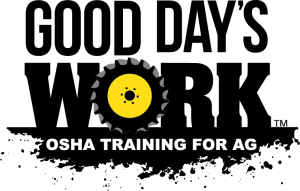What is Good Day’s Work?
Good Day’s Work is a dynamic, web-enabled, OSHA safety-training and compliance-reporting software platform unlike any other you will find.
First, all of the training’s subject matter is geared specifically for farm and other agribusiness operations.
Second, the reporting platform goes beyond any other safety-training resource to make compliance as easy as possible for you—even in the event of a surprise OSHA inspection!
All you have to do is contact us for a free quote—at which point we’ll get you and your employees set up with access so you can use the platform online, any time.
You’re buying the two key—and necessary—components of a qualified OSHA safety-training program.
Yes. If your ag operation employs anyone outside of the ownership’s immediate family—regardless of full-time, part-time or seasonal employment status—the business is subject to OSHA regulations and can be cited.
The simplest way to answer this question is with another question: Does the workplace practice present any risk of injury or safety hazard?
If so, it falls under OSHA’s General Duty Clause and, therefore, requires safety training.
OSHA’s regulations are changing and evolving all the time. As a result, especially in the field of agriculture, there are some safety hazards for which a specific regulation has not yet been written.
In the meantime, any workplace practice or activity that does not have an OSHA designation, but is nonetheless commonly known to have some degree of danger, is subject to the General Duty Clause.
Take ATV safety, for example. There is currently no official standard for ATV safety or safety training under OSHA regulations, but common sense says the activity can cause injury. Therefore, if you have employees riding ATVs, they legally must be trained on proper ATV safety.
Cost will depend on your number of employees. There is an annual fee based on the number of employees, as each employee will need their own User Account. Contact us for a free quote here.
Yes. To maintain OSHA compliance, seasonal and part-time employees have to be trained annually, and their records kept on file, just the same as full-time and other year-round employees.
On top of that, they actually are more risky to your business than regular employees. There are multiple studies (and our own client data) that show those employees cause a larger percentage of the safety accident cost compared to your long term employees.
It’s a pay-as-you-go system. When you add an employee, you’ll just log into your company account, go to your shopping cart and buy an additional user account for the remainder of your account year.
No, because the account fee is for the records keeping and compliance reporting side of your safety-training program, and you’ll need to maintain files on any employee you trained this year, even if they no longer work for you.
Then, eventually, when your annual renewal comes up, your renewal fee will be based on the number of active users at that time.
Yes, but only if the account was never used, as in the employee was never trained on anything at all. Then, it can be reassigned to another employee or closed and reimbursed.
Evaluate the available courses to see which ones apply to your operation and go from there, but keep the following in mind.
To maintain OSHA compliance:
• Every employee must take the Primary Safety Training classes every year, regardless of the tasks they perform on the job. (See the next FAQ for the difference between Primary and Specialized classes.)
• Every employee who, at any given time, will be performing a specialized activity in your operation, must take the corresponding Specialized Safety Training class every year.
• OSHA’s General Duty Clause can require safety training on tasks that do not currently have a specific OSHA regulation.
OSHA requires safety training on an ongoing annual basis, which means employees must retake classes relevant to the work they do every year, whether or not the material has been updated since they last took the course.
Yes! All classes have Spanish & English audio, as well as Spanish & English subtitle options. You can mix and match as you like. 🙂
